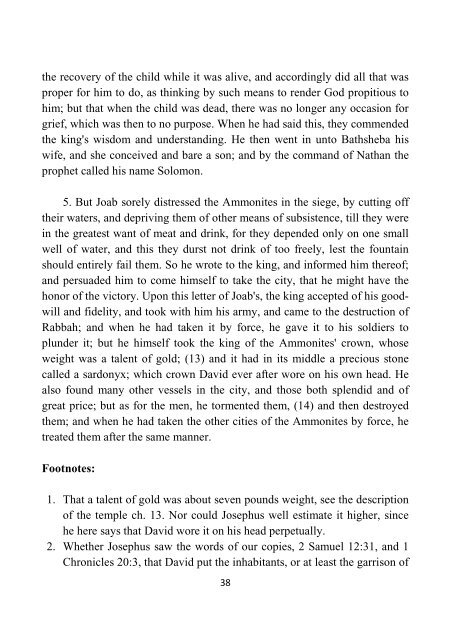You also want an ePaper? Increase the reach of your titles
YUMPU automatically turns print PDFs into web optimized ePapers that Google loves.
<strong>the</strong> recovery <strong>of</strong> <strong>the</strong> child while it was alive, and accordingly did all that was<br />
proper for him <strong>to</strong> do, as thinking by such means <strong>to</strong> render God propitious <strong>to</strong><br />
him; but that when <strong>the</strong> child was dead, <strong>the</strong>re was no longer any occasion for<br />
grief, which was <strong>the</strong>n <strong>to</strong> no purpose. When he had said this, <strong>the</strong>y commended<br />
<strong>the</strong> king's wisdom and understanding. He <strong>the</strong>n went in un<strong>to</strong> Bathsheba his<br />
wife, and she conceived and bare a son; and by <strong>the</strong> command <strong>of</strong> Nathan <strong>the</strong><br />
prophet called his name Solomon.<br />
5. But Joab sorely distressed <strong>the</strong> Ammonites in <strong>the</strong> siege, by cutting <strong>of</strong>f<br />
<strong>the</strong>ir waters, and depriving <strong>the</strong>m <strong>of</strong> o<strong>the</strong>r means <strong>of</strong> subsistence, till <strong>the</strong>y were<br />
in <strong>the</strong> greatest want <strong>of</strong> meat and drink, for <strong>the</strong>y depended only on one small<br />
well <strong>of</strong> water, and this <strong>the</strong>y durst not drink <strong>of</strong> <strong>to</strong>o freely, lest <strong>the</strong> fountain<br />
should entirely fail <strong>the</strong>m. So he wrote <strong>to</strong> <strong>the</strong> king, and informed him <strong>the</strong>re<strong>of</strong>;<br />
and persuaded him <strong>to</strong> come himself <strong>to</strong> take <strong>the</strong> city, that he might have <strong>the</strong><br />
honor <strong>of</strong> <strong>the</strong> vic<strong>to</strong>ry. Upon this letter <strong>of</strong> Joab's, <strong>the</strong> king accepted <strong>of</strong> his goodwill<br />
and fidelity, and <strong>to</strong>ok with him his army, and came <strong>to</strong> <strong>the</strong> destruction <strong>of</strong><br />
Rabbah; and when he had taken it by force, he gave it <strong>to</strong> his soldiers <strong>to</strong><br />
plunder it; but he himself <strong>to</strong>ok <strong>the</strong> king <strong>of</strong> <strong>the</strong> Ammonites' crown, whose<br />
weight was a talent <strong>of</strong> gold; (13) and it had in its middle a precious s<strong>to</strong>ne<br />
called a sardonyx; which crown <strong>David</strong> ever after wore on his own head. He<br />
also found many o<strong>the</strong>r vessels in <strong>the</strong> city, and those both splendid and <strong>of</strong><br />
great price; but as for <strong>the</strong> men, he <strong>to</strong>rmented <strong>the</strong>m, (14) and <strong>the</strong>n destroyed<br />
<strong>the</strong>m; and when he had taken <strong>the</strong> o<strong>the</strong>r cities <strong>of</strong> <strong>the</strong> Ammonites by force, he<br />
treated <strong>the</strong>m after <strong>the</strong> same manner.<br />
Footnotes:<br />
1. That a talent <strong>of</strong> gold was about seven pounds weight, see <strong>the</strong> description<br />
<strong>of</strong> <strong>the</strong> temple ch. 13. Nor could <strong>Josephus</strong> well estimate it higher, since<br />
he here says that <strong>David</strong> wore it on his head perpetually.<br />
2. Whe<strong>the</strong>r <strong>Josephus</strong> saw <strong>the</strong> words <strong>of</strong> our copies, 2 Samuel 12:31, and 1<br />
Chronicles 20:3, that <strong>David</strong> put <strong>the</strong> inhabitants, or at least <strong>the</strong> garrison <strong>of</strong><br />
38

















